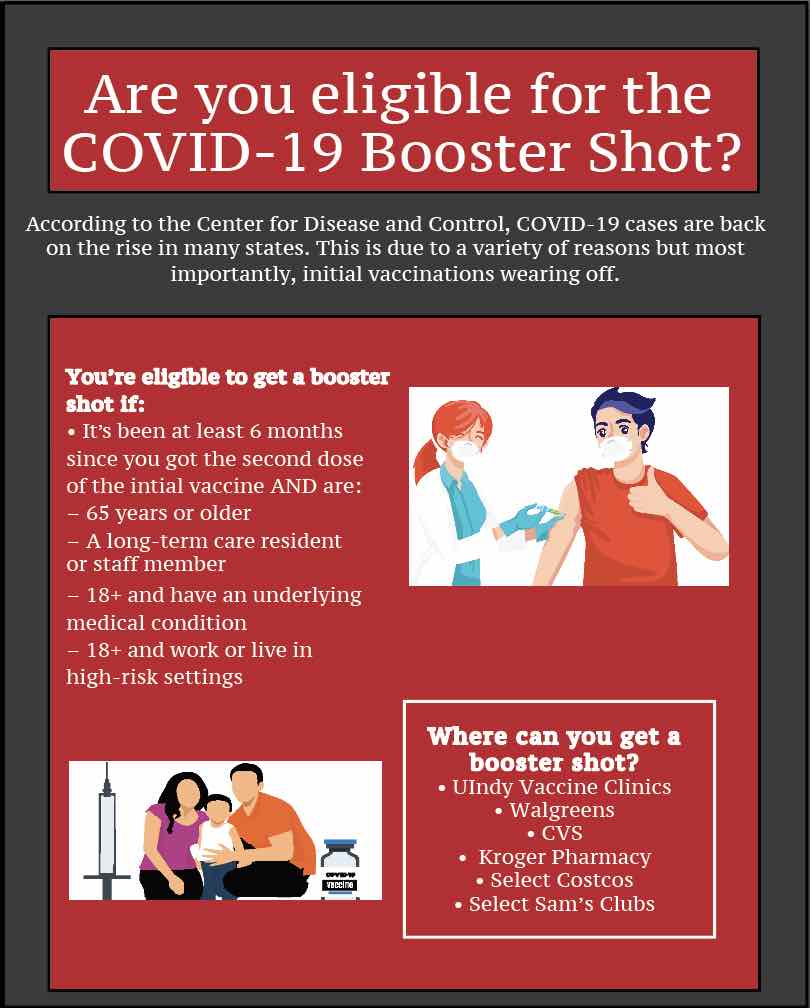The Center for Disease Control and Prevention has been slowly rolling out guidelines for those previously vaccinated to receive COVID-19 booster shots, according to their website. As of Nov. 9, the CDC said those 18 years or older should receive a booster six months after their last shot if they have underlying health conditions, live in long-term care settings or work or live in a high-risk setting. Those who received the Johnson & Johnson vaccine and are 18 years or older should receive a booster two months after their shot, according to the CDC. The CDC said that those getting a booster shot should bring their vaccination card to their appointment.
Professor and Director of the Public Health Program Heidi Hancher-Rauch said the CDC has also approved the mixing of vaccines when receiving booster shots. She said she received the Pfizer vaccine series for her first two shots, but went with the Moderna vaccine for her booster based on her personal research. Hancher-Rauch also said it may be a good idea for college-age students to consider receiving the booster as well.
“If you live in a dorm, perhaps you want to consider getting the booster,” Hancher-Rauch said. “If you spend a lot of time on a college campus, you want to consider getting the booster. Right now, it really is about your choice and how long ago you got the vaccine and how you feel, what your risk levels are, and whether you want to wait a little bit [and] whether you think this is a good time now.”
According to the CDC, the need for booster shots does not mean the current vaccine series are not working. While the vaccines are working well at preventing serious hospitalization and death from COVID-19 as well as protecting against the Delta variant, public health professionals are starting to see reduced protection, according to the website, hence the need for a booster shot. Hancher-Rauch said that it is very common to receive booster shots, specifically for most childhood vaccinations and the HPV vaccine series, and the COVID-19 vaccine is no different.
“It’s the same thing with a lot of our childhood vaccinations because what you do is you introduce it first, you let the body build up some of the immunity, then you give another dose because then the immunity will increase more at that time…,” Hancher-Rauch said. “So let’s do a booster. Then what that does is introduce it yet again, so that the immune system really kicks back up again. If your body then experiences that virus entering, what it enables it to do is fight it easier.”
While receiving a booster shot can decrease the risk of severe symptoms and hospitalization due to COVID-19, according to Hancher-Rauch, those who are vaccinated should continue to follow CDC guidelines regarding mask protocols in order to keep flu season under control this year as well. Hancher-Rauch said proper masking is responsible for last year’s milder flu season and that she encourages people to get the flu vaccine as well in order to prevent overloading hospitals this winter.
“The last thing you want if COVID[-19] gets really bad is to be in a hospital with a bunch of COVID[-19] patients because you have a really severe case of the flu—and yes, people do die from the flu, not as likely maybe, as from COVID[-19],” Hancher-Rauch said. “Our healthcare system cannot take a really bad flu season on top of a bad COVID[-19] season. And if we have a bad flu season, the chances are we’re probably going to have a bad COVID[-19] season because that means our people are circulating, unvaccinated, not wearing masks. And the behaviors that put us at risk of one are the same behaviors that put us at risk of the other one.”
Hancher-Rauch said it is important for people to get vaccinated in order to prevent the development of different variants and those that remained unvaccinated are making it more difficult to stop the spread of COVID-19. She said the development of potential variants during flu season depends on people’s behaviors.
“If we have a lot of people who are just living their lives like they were pre-pandemic, who are unvaccinated, then we have a high risk of variants circulating,” Hancher-Rauch said. “And then again, that puts us all at risk. Because, yes, we have the vaccines that are doing very well holding up against the current variants. But there are some out there in other parts of the world that if they start spreading there, we could have real problems. And so we honestly need people to get vaccinated.”








